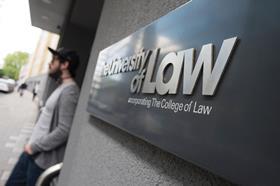The low down
Some leading international firms believe that too many candidates for entry to the profession come from similar backgrounds, using the same gilded route – a good degree followed by GDL for non-law graduates. Some may be mired in debt, but they have run up that debt confident of a well-paid future. The apprentice route promised a counterweight to this – valuing the experience of learning while working, and taking away both the burden of debt and ‘gamble’ of self-funding through law school. Aspiring lawyers proved ready to answer the call, with the few law firms offering solicitor apprentice places inundated with applications. But to gain scale, the apprentice route needs the controversial ‘super-exam’ in place – and the legal profession needs to overcome its innate conservatism.
Widening access to the legal profession is a perennial challenge. One key recent initiative to achieve this has been through legal apprenticeships, which in turn rely on the Solicitors Qualifying Exam (SQE) to become more widespread.
The whole concept of an apprenticeship is very new to the legal sector, compared with other sectors such as financial services, banking and accounting
Tricia Chatterton, BPP University Law School
Apprenticeships have been available as an alternative to the traditional graduate route to qualification since 2016, but firms have been slow to embrace them. As Paula Moffatt, director of external engagement at Nottingham Law School (NLS), explains: ‘The SQE is the endpoint assessment of solicitor apprentices, and indeed enables such apprenticeships to exist.’
Legal apprenticeships and the SQE are thus linked, and any further delays in the launch of the exam could have a negative impact on apprenticeships. (The SQE, a centralised assessment for all prospective solicitors, has been in the making since 2013. Originally due to launch in 2018, it will not be implemented until autumn 2021 at the earliest. See p20.)
Blazing a trail

Solicitor apprenticeships are among a new generation of apprenticeships called ‘Trailblazer’, which are based on standards designed by employers. The solicitor standard, approved on 3 September 2015, was created by a group of law firms and banks, including Addleshaw Goddard, Eversheds, Dentons and Barclays; with input from the Law Society, Chartered Institute of Legal Executives and Solicitors Regulation Authority. Tricia Chatterton, commercial director at BPP University Law School, says the group ‘had to conceive of an endpoint assessment. So the SQE was almost borne out of the apprenticeship, rather than the other way round’.
Released ahead of National Apprenticeship Week in February, the latest Department for Education data confirms the trend, seen since the introduction of the apprenticeship levy in April 2017, of falling starts, and a shift from lower to more costly higher-level apprenticeships. The number of people commencing an apprenticeship in England fell by 4.7% in the first quarter of the 2019/20 academic year (August-October), compared with the same period the previous year.
Solicitor apprenticeships are pegged at level 7 (equivalent to a postgraduate degree), take up to six years to complete and cost £27,000. Paralegal apprenticeships are at level 3, and take two years.
‘Higher’ apprenticeships (level 4 and above) accounted for just 4% of starts in 2014/15, but by the end of the 2018/19 academic year they accounted for 20%. Between August and October last year, level 6 and 7 starts increased by nearly 50% compared with the same quarter a year earlier.
The outlook for 2020 is not encouraging. The Institute of Student Employers’ (ISE) Pulse survey published in January showed a 2% growth in the number of apprenticeship and school-leaver programme vacancies in 2020 (compared with 7% last year). The biggest decline (-14%) is expected in the legal sector. ‘After a period of upscaling their non-graduate recruitment, firms have reached capacity and do not need to continue recruiting,’ according to the ISE survey, which also found that most respondents wanted to see the apprenticeship system reformed.
Money in the pot
A new report on apprenticeships by London First and the North West Business Leadership Team found that almost a fifth (17%) of levy-paying larger employers had not used their full allocation. Unused levy funds expire after two years and a total of £96m expired last summer alone.
The current system is ‘complicated and time-consuming’ because transfers must occur on a month-by-month basis, and cannot be block-transferred, the report found. Furthermore, funds cannot be spent to cover the administrative burden of hiring apprentices.
The two business groups called on the new government to give businesses greater flexibility in how they use funds and transfer them to other businesses, including by allowing levy payers to bulk-transfer unused funds in a ‘single, simple digital transaction’.
Under the current apprenticeship levy, employers with an annual pay bill of more than £3m are charged at 0.5% of that pay bill. Smaller businesses pay 5% of the cost of apprenticeship training and the government will pay 95%. Levy-paying employers can transfer up to 25% of their annual funds (an increase from 10% since April 2019) to any other employer to support the training and assessment cost of apprenticeships, with funds being paid monthly for the duration of the schemes.
BPP University Law School is one of two main training providers, alongside the University of Law (ULaw). BPP’s legal apprenticeship programme, launched in September 2016, has so far attracted 382 legal apprentices, including 194 solicitor apprentices.
Commenting on the relatively low numbers, Chatterton says: ‘The whole concept of an apprenticeship is very new to the legal sector, compared with other sectors such as financial services, banking and accounting.’
Training providers work very closely with employers to develop these schemes.
Based on her experience of working with firms of all sizes, including SMEs, Chatterton does not think it is the funding system that is holding them back: ‘Like anything that is new, it takes time for people to find out about it.’
City’s bespoke tailors
Magic circle firm Linklaters is working with BPP University Law School and five other City law firms, including Slaughter and May, Herbert Smith Freehills and Hogan Lovells, to design an SQE preparation course for City trainees. ‘One of the good things about the SQE process is that it liberates education providers and employers to create courses that are really tailored to their practice,’ says

(pictured), global head of learning at Linklaters.
The City Consortium’s ‘integrated suite’ of skills and education programmes will comprise: a foundation course for non-law graduates (a version of the PGDL BPP is launching in September); preparation for SQE1 and 2; and a ‘bespoke’ programme, which will be ‘very targeted towards the work that we do and the law that we practise’, says McCann.
‘For example, we’ll be able to dedicate quite a lot of time to look at legal tech, how that works and [its] legal implications, how you get the systems to work and how you could project manage bigger and more complex transactions,’ he says.
The SRA has not specified (yet) when the SQE2 should be taken – whether before, during or after the two years’ work experience, and the results of the SQE2 pilot, due out in the summer, may shed some light on this. ‘We are still in very early-build stage,’ says McCann.
It is likely that City firms will continue to cover training costs, as they do now for the LPC and/or GDL. McCann, who is also chair of the City of London Law Society’s training committee, says: ‘When we have spoken to other City firms they have been of the view that the primary aim is to make sure that the people we employ are licensed to practise and equipped to succeed, and we would want to finance those courses as much as we do now.’
Apprenticeships involve government finance and therefore bureaucracy and forms to fill in. ‘We spend a lot of time giving guidance to employers about that,’ Chatterton says. ‘We haven’t yet had a small employer which hasn’t been able to avail themselves of [the excess generated by levy payers].’
Retention rates are often cited as a key business benefit of apprenticeships (60%, according to the latest available data). ‘By the time they get to the end of the six-year programme, apprentices are so integrated into the firm they will feel they are part of the family,’ is Chatteron’s view.
Peter Crisp, pro-vice chancellor of ULaw, highlights the benefits for aspiring solicitors: ‘For a smart, engaged A-level graduate it is a very positive route. At the end of the programme, you are admitted to the roll of solicitors, you are a graduate, you have been paid the whole time, and you have no student debt.’
There are 184 solicitor apprentices on ULaw’s apprenticeship programme, launched in September 2016, and over 100 employers, including law firms, in-house legal departments and local authorities. Apprentices spend 20% of their working week, typically one day, doing course work, and the rest of the time working in law firms or in-house.
‘Currently, the lack of flexibility in the levy system is not affecting our employers,’ says Crisp, pointing to the only example where the transfer of levy funds to another employer did not occur. ‘Despite wanting to support a law centre in their home city, the commercial firm was unable to commit to a six-year period of funding. Their preference would have been to transfer the £27,000 from their levy fund in one year.’
Instead, he largely ascribes the ‘modest uptake’ of apprenticeships to the profession being ‘naturally conservative. There is quite a lot of “wait and see what everybody else does”, but there is a lot of interest. I do think this has legs’.
In September, ULaw will launch ‘graduate entry’ solicitor apprenticeships of two-and-a-half years for those who already hold a university degree. Crisp believes this will make ‘a big difference. We have seen a lot of expression of interest from firms.
‘Taking on a 19-year-old into the office is quite novel for a lot of law firms. [They] are much more comfortable recruiting graduates, who have already got the graduate skills they expect,’ he says.
New training providers are entering the market. Nottingham Law School’s solicitor apprenticeship was launched in 2019, and 15 students have enrolled. Moffatt says the design is based on the existing distance learning LLB law degree and SQE preparation courses. The programme comprises an LLB, awarded at the end of year four, and an LLM qualification, awarded at the end of year six, together with preparation for the SQE as the end-point assessment. Nottingham is working with a number of private and public sector companies to deliver the programme, and in October was awarded one of two contracts to train CPS solicitor apprentices.
What about the experiences of employers themselves? Since the first cohort joined its London office in October 2017, Dentons has been recruiting solicitor apprentices each year and now has nine.
‘Our apprentices are engaged and keen to learn,’ says Jo Wilson, diversity and inclusion manager at Dentons. ‘They bring different skills and ideas, and add to the diversity of the firm. We have been very pleased with how successful this initiative has been, and continues to be. Feedback across the firm has been incredibly positive, with all our departments keen to have an apprentice in their team.’
Dentons uses the apprenticeship levy to pay for the apprentices’ external training at BPP. ‘We would be keen to use more of our levy, if possible, and have recently set up the solicitor apprenticeship programme in our Milton Keynes office, and are hoping also to set up the programme in Scotland,’ she says.
Eversheds Sutherland has been hiring solicitor apprentices since September 2016 and now has 34 across eight offices in England. The plan is to continue to recruit around 10 apprentices each year.
The firm is not currently using all of its apprenticeship levy, and is ‘constantly investigating’ ways to increase the number of apprenticeships on offer – for example, by extending them to other areas of business such as IT, finance and marketing.
‘The biggest issue we face is around resource to set up and manage new apprenticeship programmes within the firm,’ says James Wilson, emerging talent business partner. ‘This is where more flexibility with the use of the levy pot would be beneficial, with firms being allowed to use a set amount towards providing this resource which could in turn allow for expansion of the apprenticeship programmes,’ he says.
Despite the drawbacks, demand for places dramatically outstrips supply. ‘The apprentice solicitor route is becoming increasingly popular year on year, both internally and externally. This year we received 500 applications for our 10 roles,’ Wilson says.
If candidates can’t afford to pay for the GDL and LPC, then they are potentially not going to enter the profession, and that affects the under-represented groups more than anyone else
Paul Gascoyne, Shearman & Sterling
This is down to a more general awareness of the apprenticeship opportunities within the legal sector and how to access them. ‘We spend a lot of time working with schools and colleges to promote the route as a genuine alternative to qualification,’ Wilson says. As more apprentices enter the profession, prospective applicants have ‘tangible’ examples of what is possible through this route.
Internally, teams are also seeing the ‘huge beneficial impact’ of apprentices. ‘To a certain extent, I think the introduction of the SQE has also helped increase the popularity of apprenticeships,’ according to Wilson. ‘The change has generated more discussion on entry into the profession and different routes available and therefore highlighted apprenticeships as an option.’
Linklaters is not currently offering legal apprenticeships, but Patrick McCann, global head of learning, says: ‘We are seeing more of them than we were, and certainly Deloitte are going into this space in a fairly big [way]. The market is moving pretty quickly.’
Last autumn, Deloitte’s legal arm (which was awarded an ABS licence in 2018 and now has a UK headcount of more than 200) launched solicitor apprenticeships as part of the wider firm’s ‘BrightStart’ scheme, as well as a new ‘SQE training contract’, which will not require the Legal Practice Course. Both are delivered by ULaw.
For those embracing apprenticeships, much is riding on the SQE. Paul Gascoyne, senior recruitment manager at Shearman & Sterling in London, says: ‘From a recruitment point of view, the SQE will allow more flexibility. The current model is very rigid, you never really see candidates who haven’t studied in the same way… one of the big issues in the profession is that if candidates can’t afford to pay for the GDL and LPC, then they are potentially not going to enter the profession, and that affects the under-represented groups more than anyone else.’
Gascoyne is hopeful that the SQE will ‘open the law school market’, making it cheaper for aspiring solicitors to study and train. ‘At the moment, the market is really dominated by BPP and the University of Law, and essentially what they do is to match each other’s price, so the prices really just go up.’
For now, though, supporters of the SQE are having to be patient – even as sceptics urge further delays to implementation. The SQE is still subject to final approval from the Legal Services Board, and the SRA has said that it expects a decision from the LSB in late-2020.
In a report published in October, Chris Nichols, the LSB’s director of regulation and policy, said a number of ‘substantive issues’ were raised by the SRA’s first application (approved in March 2018), including concerns over quality, cost and accessibility of assessments, and equality and diversity. The LSB said the SRA must ‘fully address’ these and other issues raised by stakeholders in its next application, due to be submitted in July or August 2020.
Marialuisa Taddia is a freelance journalist
































No comments yet